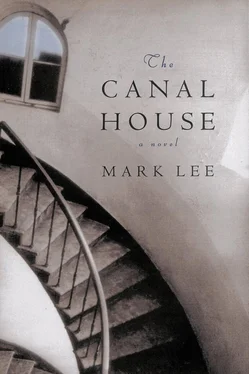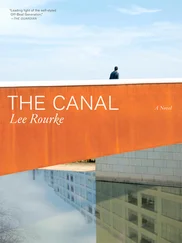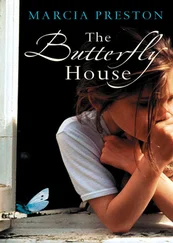“What do you think he’d do?”
“I don’t want to find out.”
“I’m not the sort of person who likes to hide.”
“We’re not hiding,” I said. “At least, I don’t see it that way.”
Daniel was quiet as the train stopped in Swindon. When we started moving again, he looked out at the flat farmland and the road running alongside the track. “There was a jazz ballad that was popular in the 1950s,” he said. “It’s called ‘Let’s Get Lost.’”
“I like that idea. Can you arrange it?”
We checked into a small hotel near Paddington Station and took the lift to the fourth floor. Daniel tossed his bag onto a chair, then closed the curtains. Both of us were exhausted. Still in our clothes, we fell asleep on the narrow bed.
I woke up that afternoon when someone ran a vacuum cleaner in the hallway. Daniel had vanished, and for a few panicky minutes I thought that he had fled the hotel and caught a plane back to Rome. No, I thought. That couldn’t happen. If Daniel had changed his mind, he would have switched on the lights, sat on the bed, and told me.
I splashed some water on my face and was ordering tea when Daniel returned. He had been down in the lobby, calling his contacts in London to ask if they knew of an empty flat he could sublet for a short time. After leaving messages on a dozen answering machines, he got a call from Carter Howard, the photo editor at Newsweek . Carter told him to ring his lover, Jonathan, who had an artist friend who was running off to California.
“She needs someone to watch her house,” Daniel said. “For one week or one year. She’s not quite sure. Let’s have dinner and go see her tonight.”
We ate at an Indian restaurant, then took a taxi over to the Canal House. Amy Pickering was in her late forties, a heavy-set woman known for her silk screens of old news photos and her antiwar politics. One night, as she was waiting for friends at the Sheraton Hotel bar, she’d met an American marine, a young fighter pilot on his way back from a NATO military exercise.
They ended up in bed, which was improbable, and fell in love, which was impossible. Now the pilot had been transferred back to the Air Ground Combat Center in the desert near Twentynine Palms, California, and Amy was following him there. She felt like Marlene Dietrich taking off her shoes to run after Gary Cooper and the other Legionnaires as they slogged through the sands of Morocco.
“I’m crazy to do this. Absolutely insane.” Amy gestured with her hands as she gave us a tour of the house. “I hate the army and the navy and the bloody air force. All those stupid uniforms and macho death wishes.” Amy had no idea how long she’d be in the States and offered us a low week-to-week rate.
We stayed at the hotel for a few more days while Amy bought her tickets and finished packing. I hadn’t earned much of a salary working for relief organizations, but they paid your expenses on a field mission and I had managed to save up a fair amount. Daniel had given most of his savings to Boma Mission and a convent of nuns in Rome, but several German and Scandinavian magazines still owed him payment for articles. Together we weren’t exactly rich, but comfortable enough to stop working for a few months. I decided to stay away from Laura’s flat and buy a few extra clothes when I needed them. Laura would have asked me for an explanation and I didn’t know what I would say to her. Perhaps I was acting like a complete fool and throwing my life away, but I wasn’t in the mood to hear that from a friend.
On the day Amy was supposed to leave, we bought bagels and cream cheese and went over to the Canal House. Amy’s bags were packed, but she kept changing her mind about her fighter pilot. “He likes sexist video games and McDonald’s hamburgers,” she said. “But he’s innocent about most things and very affectionate.” She looked down at her tea cup. “He also has a very smooth stomach.”
“Go with the stomach,” Daniel said. “You can change the politics.”
A taxi came to the door and Amy sent it away. Finally, she gave us the keys when a second taxi appeared. Looking giddy and frightened, Amy waved out the window. The cab disappeared around the corner. Daniel closed the door and we stood in the entryway looking at each other.
When I was a girl on family trips I had always kept the road map beside me, determined to save my parents from the wrong exit and the unknown road. I hated getting lost and refused to go on any journey without a plan. But now I was here, with Daniel, in a stranger’s house without a job or responsibilities. I felt as if I was standing on the edge of a dark lake and I didn’t know how deep it was or if there were sharp rocks hidden beneath the surface. There were so many reasons to be cautious, but I took Daniel’s hand and we jumped together.
WE STAYED INSIDE the Canal House for the next two days, mostly in bed. I remember looking down at Daniel’s face and trying to memorize his features: the dark brown eyes and the small scar near his chin. I lay beside him and then beneath him while he lifted me off the mattress. And then I was above him again, kissing his chest and stomach. Silence, then inexplicable sounds, both of us holding on hard, almost desperate, until the ending and the silence again. Sheets pushed onto the floor. Fogged-up windowpanes. And we both started laughing for no reason at all.
Daniel and I finished off the food that Amy had left in the refrigerator, then made our first explorations through the neighborhood to buy food and wine. Returning home, we examined our sanctuary for the first time. The Canal House had been built in the nineteenth century and it displayed all the redbrick confidence of the Victorian Gothic style. It had buttresses on the corners and a brick pinnacle decorating the roof. The Pakistani immigrants who lived in the neighborhood ignored the building, but once I caught an older man with a tweed hat staring at the house with a look of amused condescension.
The house had two stories: one at street level, the other below the street that was supported by the bridge that curved over Regent’s Canal. As we returned that day on the canal path, I looked up and saw the arched windows, all of them framed by intricate brickwork. To me, it looked like a Victorian chapel, something staid and industrial that had once blessed the coal barges pulled through London.
Set apart from any other buildings, the house felt like an island in the middle of the city. When you came through the front door there was a small bathroom on the left side and a walk-in closet on the right. After that, you were standing in one long space, divided by half walls into a kitchen and a living room that looked out over the canal. There was a power plant across the way and at night small white lights glimmered on the turbines and towers, like a Christmas display without the star.
The house was filled with a jumble of cast-off furniture, the sort of tables and chairs you bought from friends who got married or took jobs in the States. Everything was saggy and frayed and we never worried about spilling a cup of tea. None of the silverware matched and the dishes were chipped and cracked. The kitchen stove rarely started on the first match and we learned to treat all the appliances like aged relatives that need to be coaxed and coddled to behave. The clothes dryer didn’t work at all until Daniel took it apart and discovered that mice had been chewing on the drive belt.
Amy’s silk screens and posters hung on the walls, but mainly there were books. Thousands of books. Sometimes I thought that the Canal House was sort of a black hole: when a book passed across the transom it was pulled into the building’s gravitation thrall. They were stored everywhere, in heavy oak shelves and board-and-brick improvisations. There had been no attempt to organize them by genre or theme; a romance novel with a lurid cover was squeezed between Critique of Pure Reason and The Practical Apiarist .
Читать дальше












